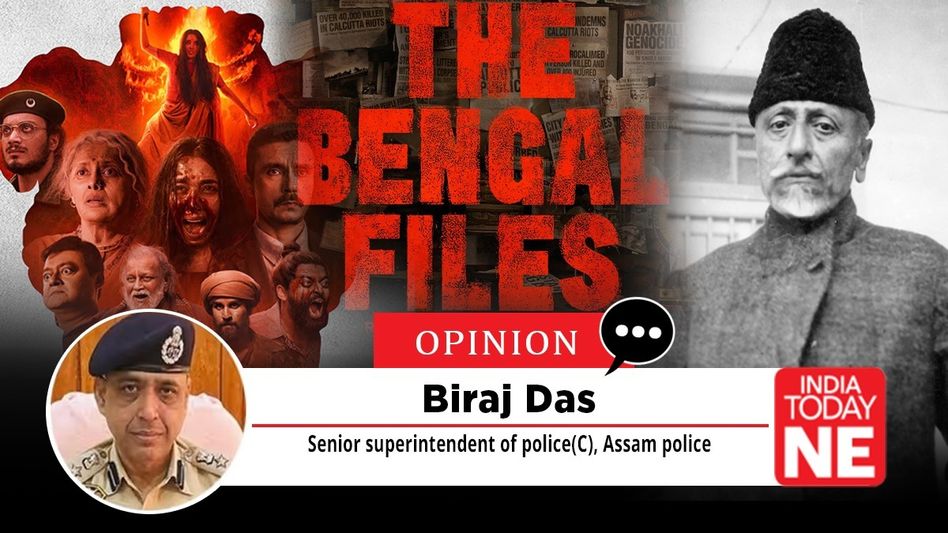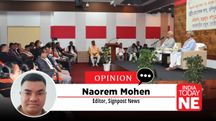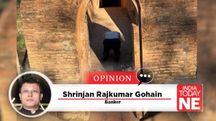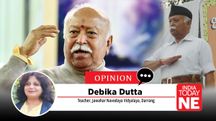The Bengal Files opens old scars, Maulana Abul Kalam Azad’s story could heal them
Watching The Bengal Files felt less like viewing a film and more like walking through the still-bleeding corridors of history. Every character, whether Mithun Chakraborty’s haunted Madman Chatur or Pallavi Joshi’s resolute Maa Bharati, becomes a mirror reflecting what Bengal has lost and what India continues to carry within its civilisational memory. Amid this journey through wounds, courage and shattered worlds, one realisation stands out with unmistakable clarity: India needs a film on Maulana Abul Kalam Azad, Independent India’s first Education Minister and one of the greatest champions of unity. If The Bengal Files exposes the consequences of division, a film on Maulana Azad would illuminate the power of knowledge, compassion and nation-building, the very antidote to the fractures we continue to inherit.

I watched The Bengal Files on Zee5 and the film touched me in a way that is hard to forget. Mithun Chakraborty as Madman Chatur carries the story with great depth and his silence alone shows the consequences of the wounds Bengal has suffered. Pallavi Joshi as Maa Bharati and Simrat Kaur as the younger Bharti bring honesty to every moment. Darshan Kumar as CBI officer Shiva Aloke Pandit walks us through the hidden history of Bengal with calm determination. Dibyendu Bhattacharya as Rajendralal Roychowdhury, the Damodar of Naokhola, reminds us that hatred always has consequences even for those who think they are protected by power and privilege. The scene where the radical leader Kasimuddin chops off his head in front of the Ma Kali idol shows how frightening the consequences of blind hatred can be.
The film is directed and written by Vivek Agnihotri, produced by Abhishek Agarwal, Pallavi Joshi and Vivek Agnihotri, with cinematography by Attar Singh Saini and editing by Shankh Rajadhyaksha.
One scene with deep emotional consequences is the conversation between older Bharti and Amar, the Sikh man who shelters her. Amar first says that Bengal is just a piece of land and could be given to Pakistan if it brings peace. Then Bharti gently explains what Bengal truly is. She tells him that Bengal is not only soil. It is centuries of music, poetry, devotion, courage and dignity. It is the land where people lived with refinement and warmth and where culture shaped everyday life. When Amar listens, he realises the consequences of looking at Bengal only through politics.
Amar’s character is played with dignity by a strong supporting actor. He reflects the Punjabi Sikh spirit of bravery and patriotism. Sikhs have always stood up whenever the nation faced consequences of war, crisis or violence. In the film too, Amar listens with respect and protects Bharti without fear.
Bharti explains that Bengal was never weak. It was a civilisation built on culture and Sanatan strength. The people believed that true power came from spirituality and their connection with the supreme. Festivals like Durga Puja were not only celebrations. They were reminders of unity. The consequences of losing such a rich cultural world are beyond measure. Bengal’s love for knowledge, theatre, literature and debate shaped entire generations. These were signs of strength and not signs of softness.
This understanding has consequences for how we see the present. Bengal produced Vivekananda, Rabindranath Thakur, Sri Aurobindo, Ramakrishna Paramahamsa, Maa Sarada Devi, Bankim Chandra Chattopadhyay, Meghnad Saha, Jagadish Chandra Bose, Prafulla Chandra Ray, Subhash Chandra Bose and many others. These names show how Bengal carried spirituality, science, culture and nationalism together. The consequences of radicalism breaking this civilisation were not only political. They were emotional, cultural and civilisational.
Sometimes I feel, just as Bharti suggests, that if Bangladesh had remained with India, we would have held a united civilisational strength. The consequences of division tore apart families and weakened shared traditions. People who lived as one community for centuries were suddenly separated.
The scenes of Gandhi and Jinnah in the film made me think of Maulana Abul Kalam Azad, a leader whose life carried deep consequences for India’s unity. He was born on 11 November 1888 in Mecca in the Hejaz region. His ancestors moved from Afghanistan to Bengal generations earlier and later returned to India. Young Azad grew up in Calcutta surrounded by books and spiritual teachings. The consequences of that upbringing made him a man who could unite religious knowledge with national loyalty.
As a young man he travelled across the Arab world and studied theology, philosophy, mathematics and world history. When he finally settled in India, he believed that his destiny was here. The consequences of that decision shaped the national movement. He became one of the youngest editors fighting for freedom. He opposed any division of India and became one of the strongest voices for Hindu–Muslim unity.
As independent India’s first Education Minister, he laid foundations whose consequences are still visible today. He helped establish the Indian Institutes of Technology in 1951 and the University Grants Commission in 1953 and supported the Indian Council for Cultural Relations. These steps shaped the future of science and education in India.
Today we watch films like The Kashmir Files, The Kerala Story and The Bengal Files to understand painful truths and their consequences. In the same spirit, India needs a meaningful film on Maulana Abul Kalam Azad. A film on his life will reflect the true Sanatan sense that lives in our DNA. It will show that unity is our strength and knowledge is our foundation.
The Bengal Files is not just a movie. It is a reminder of the consequences of hate and division and also a reminder of the strength that lies in unity, memory and courage.
A film on Maulana Azad will complete this message and show the world that India’s real power comes from hearts that are larger than consequences and larger than hate.
Copyright©2025 Living Media India Limited. For reprint rights: Syndications Today









